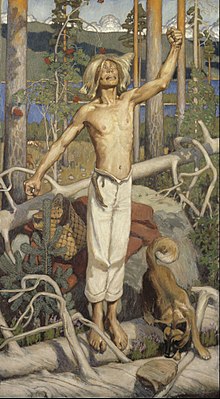This week's post is a feminist Goodreads review about J.R.R. Tolkien's The Story of Kullervo, edited by Verlyn Flieger. This review can also be found in my Goodreads account here. I gave this book a 1/5 on Goodreads - I was quite underwhelmed by the structure and dynamic of this book, to be honest, not to mention I found quite a lot of problematic patriarchal and misogynistic content (as I already knew existed in the original tale of the Kalevala).
-Disclaimer: This review, of course, includes my personal views and are not supposed to be generalizations or objective truths. I do think, though, that the Patriarchal content is very problematic from an objective viewpoint.
Here are some points I chose to discuss and/or highlight about this book:
- Not a very engaging or well-constructed structure overall, and lots of sexist mindsets around, not only in the retelling of Kalevala's Kullervo (there's heaps of sexism and patriarchal ideas in the Kalevala, and in my opinion the form is not good enough to "make up for it" in this case, as opposed to, say, The Iliad), but also in Tolkien's essay.
- Problematic author comment: According to Tolkien, the women and 'housewives' are the ones who 'rule' in the homes in these tales ("mothers-in-law where worse than anywhere else in literature (...), sons and their wives under the iron hand of the Matriarch."). Did he just ignore all the violence and oppression towards women in the society portrayed in these tales? (because self-centred male privilege can do that to people, in a subconscious way, too). Or does he maybe think that the fact that many women are the ones who educate their children in the patriarcal values means 'real power'? Because that's not executive or 'real' power at all. More than anything, it means that the men in these tales (and in real life as well) are lazy and/or cruel enough that they don't even do the dirty work, leaving it to women to be the ones to promote and uphold the system and gender roles, teaching toxic masculinity to men and submissive oppression to women. To quote Hélène Cixoux: “Men have committed the greatest crime against women. Insidiously, violently, they have led them to hate women, to be their own enemies, to mobilize their immense strength against themselves, to be the executants of their virile needs.”
 |
| Hélène Cixous |
- Bonus problematic author comment: "a medieval lover who takes to his bed to lament the cruelty of his lady in that she will not have pity on him, condemning him to a melting death". So saying no to sex is being cruel and condemning a man to death, I SEE, thank you for that fine example of male entitlement.
- About the story of Kullervo, I find it especially ridiculous that we're supposed to feel terrible about the tragic 'incest' issue - which is way less problematic than the misogyny and sexism that's running rampant in these Finnish mythological tales - and not even bat an eye about the fact that Kullervo is a rapist with heaps of male entitlement who literally assaults random women he meets in the woods, but it's cool because he's not good looking (in this version at least) so he's being discriminated if women don't want to be raped! Also cool because he has been bullied and enslaved and victimized (so that gives him a right to be a violent misogynist, apparently), and he's oh-so-hurt and offended that the frightened women reject his advances (aka harassment).
- As usual, priorizing male entitlement and hurt fragile egos before women's safety and their right to bodily and mental integrity. Also, if you've been bullied and treated badly and that makes you think it's justified that you lash out even more aggressively and violently towards others, newsflash but you're not a good person either, and your misfortunes do not justify those kind of actions.
- Problematic editor comment: Also, according to Flieger, consent is 'equivocal' because sister Wanona 'did not resist for long', after Kullervo literally harasses her, pursues her and lays hands upon her, assaulting her. OK then. Because we've never heard of a sexual assault victim being frightened enough that she (they) don't resist 'for long'. That doesn't make it any less of a rape. Because, fyi, if someone has to be coerced or convinced in any way, as is this case, it's not consent .
- But no, the main trigger warning is the incest detail- a societal construct that, in those cases where there is less power imbalance (brethren, for example), is objectively way less problematic than the issue of rape culture and sexual harassment, and yet the first issue has a massive taboo associated to it (understandable in many cases due to massive power imbalances, although I'm not sure it's mainly about that for society), while the second one is too often ignored, excused and glorified. Wrong priorities, everyone. And this is even more grating if we take into account that Flieger is a woman and should thus be more aware of the rape culture system from which all women suffer.
 | ||
| Kullervo's assualt of her sister seen as 'romantic' (???), 'tragic' or 'with equivocal consent' (!!!) promotes rape culture and glorifies abusive relationships. Manuscript Illustration By Jay Johnston
"Finally, he meets a beggar-girl who also rejects him at first, struggling and screaming when he pulls her into his sleigh. But he starts talking to her sweetly and shows her all the gold he's collected during his trip, bribing her into sleeping with him. Afterwards, she asks who he is, and as she realises he's her own brother, she commits suicide by throwing herself into the rapidly rushing river nearby. The distraught Kullervo returns to his family and tells his mother what happened." (Source)
"the maid was affright and shrank from him. 'Death walketh with thee, wanderer, and woe is at thy side.'
Then Kullervo was wroth; but very fair was the maiden and he said ''Tis not good for thee to be alone in the forest [maybe because of rapists and stalkers like you, asshole??];nor does it please me; food will I bring thee and fare abroad to lay and lie in wait for thee, and gold and raiment and many things of cost will give thee [turning to manipulation and bribing is *not* consent].'
'Though I be lost in the evil woods, and Tapio has me fast in his hold,' said she, 'yet would I never wish to roam with such as thee, villain. Little does thy look consort with maidens (...)'
But Kullervo was wroth in that she had reviled his ungainliness, and put kind [??] thought from him and cried: 'Lempo seize thy folk and swift would I put them to the sword didst I come upon them, for thou I wilt have, nor shalt thou dwell in thy father's house again.'
Whereat she was adread and sped like a wild thing of the woods through the tangle from him and he angry after her: till he laid hands upon her and bore her in his arms away in the depths of the woods.
Yet was she fair and he loving with her [??? Is she supposed to be thanking him for raping her less roughly?? He hasn't been exactly loving so far. Also, he's allowed to be ugly but the fact that she's fair makes him treat her 'better'?], and the curse of the wife of Ilmarinen upon them both, so that not long did she resist him and they abode together in the wild"
LOOK AT ALL THAT EQUIVOCAL CONSENT. This is textbook harassment and sexual assault, Ms Flieger. This is rape. Plenty of women 'do not resist for long' and it's still rape. 100% of Kullervo's actions scream rape. Shame on you for excusing that (also shame on Tolkien for choosing in this case to treat the theme of sexual harassment so lightly, as something that will give the antihero - aka the rapist! - emotional man pain™ at the cost of a woman's abuse. Yes, the original's not his, but he chose not to change or subvert any of the problematic stuff). and Let us also note that Wanona actually curses and blames herself for being alone and being, you know, assaulted (typical victim blaming argument), and that Kullervo is distraught because she was his sister, not because he has just raped a woman, and has done the same with others.
"Kullervo sits down to eat, but his beloved heirloom knife breaks on one of the stones in the bread. Kullervo is overwhelmed with rage. He drives the cows away to the fields, then summons up bears and wolves from the woods, making them appear like cows instead. He herds these to Ilmarinen's house and tells the wicked mistress of the house to milk them, upon which they turn back into wolves and bears and maul her. As she lies there bleeding, she invokes the high god Ukko to kill Kullervo with a magic arrow, but Kullervo prays for the spell to kill her instead for her wickedness, which it indeed does." (Source)
It's all too misogynistic for my taste, sorry.
|






Astonished and amazed by your review! So well done!
ReplyDeleteI feel the same. I couldn't agree more!
^^ :)
Delete